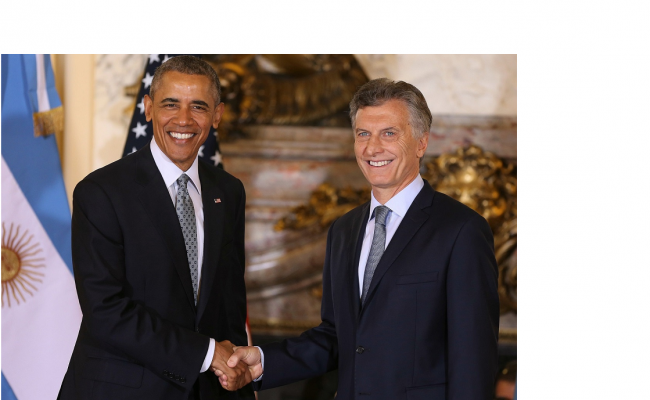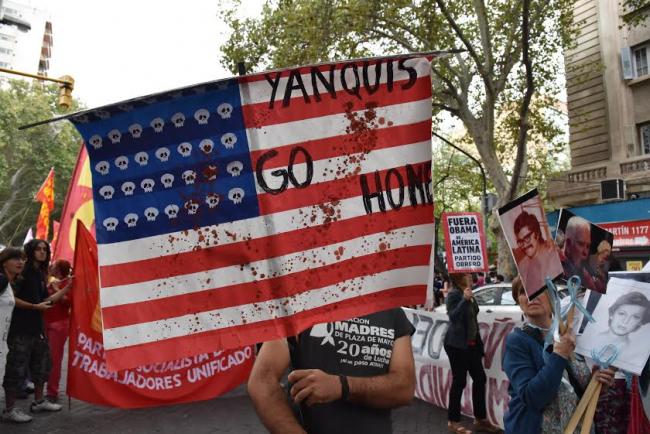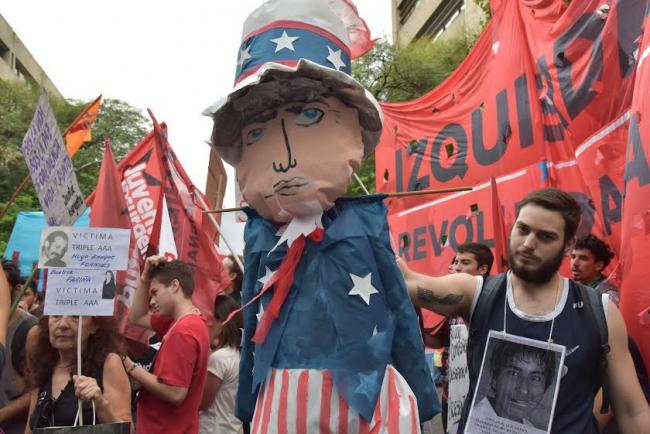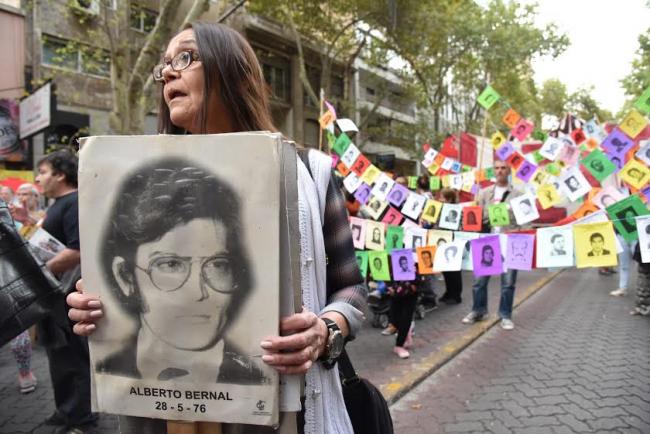
This is the third and final installment of our series on last week's presidential trip to Cuba and Argentina. Click to read parts one and two.
The United States has a new friend in South America. That was the message surrounding Barack Obama’s visit to Argentina last week. In an interviewwith CNN Español, Obama declared that the era of anti-Americanism had ended, a reference to the passing of over a decade of sour U.S.-Argentine relations during the governments of the late Néstor Kirchner and Cristina Fernández de Kirchner. When Obama landed in Buenos Aires on the eve of the fortieth anniversary of the coup that launched the nation’s darkest period of military rule, he arrived in the name of hemispheric realignments and in praise of recently elected President Mauricio Macri’s “contributions to the defense of human rights in the region.”
On the heels of his historic trip to Cuba, Obama’s visit marked the first bilateral meetings between the U.S. and Argentina in almost twenty years. Yet not everyone received the news with such ebullient good cheer.
On March 24, the day of the anniversary, Obama toured the Parque de la Memoria. The memorial to the victims of the dictatorship that lasted from 1976-1983 sits on the banks of the Río de la Plata – waters in which thousands perished in the junta’s notorious “death flights,” after being drugged and thrown alive from airplanes. Notably absent were the Mothers and Grandmothers of the Plaza de Mayo, two of the nation’s leading human rights groups. They, along with several other major human rights organizations, cancelled their plans to attend the ceremony the day before. Nearby, at the Navy Mechanics School, the former clandestine detention center, converted into a National Museum of Memory, large banners brandished a clear message: “USA-Obama Out.”

In an open letter to Obama, Adolfo Pérez Esquivel, the 1980 Nobel Peace Prize winner and human rights activist, put the significance of Obama’s visit into perspective by way of a brief history lesson: “It is important that you know you are not coming to Argentina on just any day. In 1976, while you were only 14 years old, and your country was celebrating two centuries of independence, we were starting the most tragic period of our history.” Pérez Esquivel was himself imprisoned and tortured for 14 months by one of Latin America’s most vicious Cold War regimes. As he reminded Obama, that dictatorship counted on “the financing, training, and coordination [of] the United States.”
March 24 is officially commemorated as the Day of Remembrance for Truth and Justice. Obama’s solitary tour through the Parque de la Memoria stood in stark contrast to the massive rallies taking place around the country. The marches and processions to mark this year’s anniversary were some of the largest in recent memory. Estela de Carlotto, president of the Grandmothers of the Plaza de Mayo, addressed the crowds packed deep in the center of Buenos Aires. In her speech, she repeated the galvanizing theme of this year’s tributes: “Without rights there is no democracy.” As with every March 24, the day paid homage to the victims of state terror and to the ongoing fight to bring to justice the crimes of the regime. But this year’s commemorations held a special charge. They served as a referendum on the Macri administration thus far, in which the remaking of US-Argentine relations plays a critical role.

Obama is not the first U.S. president to “bury the last remnant of the Cold War” in Latin America. In 1990, George H.W. Bush’s visit to Argentina came amidst a state of emergency in the country, following the uprising of rebellious military officers who felt threatened by the possibility of prosecution for human rights abuses committed during the dictatorship. On that visit, Bush thanked then-president Carlos Menem for his commitment to steering Argentina towards free market policies, and for sending Argentine troops to the Persian Gulf. The gesture was "a clear sign,” he told Menem, “that you are assuming your rightful place as a leader among freedom-loving nations.” In 1997, Bill Clinton’s whirlwind tour occurred against the backdrop of discussions surrounding the Free Trade Area of the Americas (FTAA) agreement, and Argentina’s designation as a non-NATO ally. The trip marked the height of what became known as the era of “carnal” US-Argentine relations.
Throughout the 1990s, Argentina was a shining example of the Washington Consensus and Menem its most enthusiastic booster. His government courted foreign investment and introduced austerity measures that led to a punishing rise in inequality and sovereign debt. And while selling public utilities and state enterprises to the highest bidder, Menem also pardoned previously convicted military officers, citing national reconciliation and the dawn of a new age of prosperity.
The era of illicit U.S.-Argentine relations took a nosedive at the start of this century. In 2005, George W. Bush arrived at the Summit of the Americas in the seaside town of Mar del Plata with plans to finalize the details of the FTAA. As was widely reported at the time, his presence sparked massive protests against the free-market recipes of the previous decade. The host of the summit, Néstor Kirchner, who assumed the Argentine presidency in the aftermath of the country’s 2001 economic crisis, delivered a succinct message: US-backed economic policies had produced nothing but “misery, poverty, and democratic instability.” Negotiations for the FTAA tanked, and Bush left Argentina in a fury. It was a stunning turn of events, and a defining moment in the broader regional move away from neoliberal experiments.
Last week, Obama came to inaugurate a new chapter in bilateral relations, bearing the same free-market recipes as his predecessors. The visit confirmed Argentina as a principal ally in the midst of the continental retreat of the “pink tide;” it also underscored the Macri administration’s role in leading a rightward shift across South America.
In his first 100 days in office, Macri has quickly set out to undo the policies of the Kirchner years through the elimination of agricultural export taxes, the end of energy subsidies, massive layoffs in the public sector, and a devaluation of the currency. During their talks, Macri and Obama fortified commitments to increase commercial ties between the two nations. While the initial agreements remain shrouded in mystery, the meetings pointed to future deals in agribusiness, telecommunications, and energy. Further details will likely emerge over the coming weeks. But as an immediate outcome, the agreements move Argentina one step closer towards greater participation in the Trans-Pacific Partnership, while bolstering Macri’s related desire for closer economic ties with the European Union.
The final piece in realigning Argentina back toward world markets involves the issue of debt. In early March, the Macri government reached an agreement to pay the remaining “vulture fund” holdout creditors. Obama’s visit coincided with ongoing congressional debates surrounding the decision to settle the 15-year dispute, a legal battle that has played out dramatically in a New York federal court and which includes a silent-movie-worthy villain in the figure of Judge Thomas Griesa. Asked to make a statement on the ongoing case, Obama demurred: “I have to be careful not to comment because of the nature of our legal system. These are judges that I appoint.” He nonetheless offered a clear verdict on the implications of the impending settlement, which totals over $4.6 billion dollars in payments to U.S. creditors. “Today in a show of confidence in Argentina’s new direction, many U.S. businesses are announcing tens of millions of investments here in Argentina,” Obama stated.
What of human rights in all of this? During his brief remarks at the Parque de la Memoria, Obama reaffirmed the commitment that his administration would declassify military and intelligence documents related to the U.S. role during the dictatorship. To be sure, the release of FBI, CIA, and Defense Department records is a positive step that responds to years of demands on the part of human rights groups and international organizations to open wide the history of U.S. support for the dictatorship. Despite the announcement, the news did not garner more favor for this renewed age of bilateral relations, which comes at moment of alarming developments in the realm of human and civil rights. As Gastón Chillier and Ernesto Semán note, in his first months in office, Macri has ruled by decree to a staggering extent, declaring a state of emergency in the realm of security to combat corruption and drug trafficking. The measure has justified the revamping of Argentina’s police forces, a spike in arbitrary arrests, and the criminalization of social protest. Against the backdrop of these events, the release of dictatorship-era documents is a calculated maneuver that allows Macri to take credit for promoting a human rights agenda, at the same time that the basic human rights of many government opponents go unprotected.
Each passing March 24 reveals as much about the preoccupations of the present as about the evolving interpretations of the past. The banners, signs, songs and slogans of last week’s commemorations reflected a prominent and convincing narrative of recent Argentine history, which makes explicit links between economic adjustment and political and social violence, beginning with the dictatorship itself. But this is also a new moment. Macri’s democratically elected right-wing government has proved adept at using the history of human rights to instrumental effect in the name of contemporary security concerns and as a way to bolster his conservative agenda in the region.
Obama’s landmark visit to Latin America last week also tested the uses and meanings of human rights. A reporter asked Obama to reflect on the reach of the U.S. during Latin America’s prolonged and bloody Cold War. Obama paused, and after acknowledging that he was an avid student of U.S. foreign affairs, concluded: “Our experiences with a country like Argentina helped us to develop a more mature and ultimately a more successful approach to foreign policy.” Obama was making a direct reference to the incorporation of human rights as an official U.S. foreign policy concern in the 1970s during the Carter administration. But the response also conveyed a different message in the context of this moment of renewed hemispheric alliances: It allowed Obama to condemn the most lamentable effects of U.S. action, while re-affirming the commitment to the same economic and political objectives. “We cannot forget the past,” Obama remarked upon finishing his tour of the Parque de la Memoria.

As U.S. and Argentine flags flew over the Río de la Plata, Obama and Macri boarded their respective planes for an afternoon respite in the southern city of Bariloche, new friends in the service of time-honored goals.
Jennifer Adair is an assistant professor of history at Fairfield University. She is currently completing a book on the politics of human rights in post-dictatorship Argentina.

